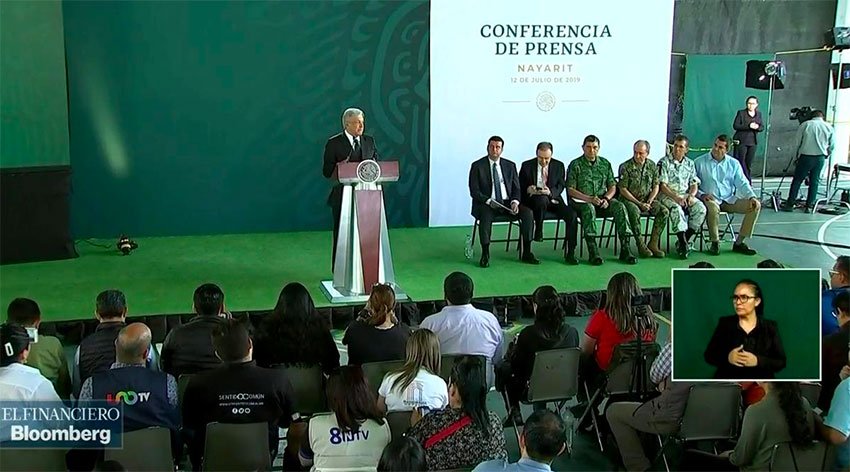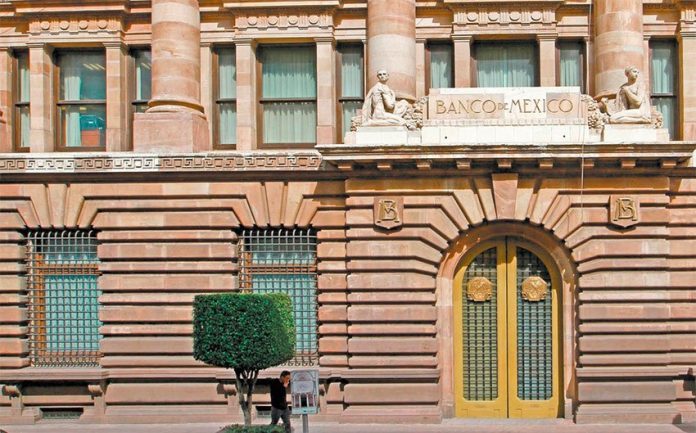Economic growth will fall to its lowest level in 10 years in 2019, according to the central bank, which warned that there is also a possibility that the economy will enter into a “light recession.”
Minutes released yesterday from the Bank of México (Banxico) June 27 board meeting state that “economic activity in Mexico is showing greater deceleration than anticipated” and “growth rates now suggest the possibility of a light recession.”
Banxico is forecasting growth of between 0.8% and 1.8% this year, while private sector economic specialists consulted by the bank for its June survey predicted that the economy will expand by 1.13% in 2019 compared to 1.32% in the May survey.
The minutes show that one board member warned that growth will likely be around the lower end of the Banxico range but some improvement is expected in 2020.
Another deputy governor said that the downward revisions to growth outlooks are the result of a “weaker international [economic] environment and internal factors.”
The same board member predicted that economic weakness will persist, investment levels will continue to show signs of sluggishness and consumption will continue to lose dynamism.
A majority of board members agreed that downside risks to the economy had increased since the last time they met.
Among the external risk factors is the possibility that the ratification process for the new North American trade agreement will encounter difficulties in the United States and Canada. Mexico’s Senate approved the pact last month.
The possibility of the United States imposing new tariffs on Mexican exports also looms as a potential threat.
The U.S. announced Monday that it would impose tariffs on some fabricated structural steel imports from Mexico after an investigation determined that some exporters receive unfair subsidies.
Mexican officials and analysts downplayed the impact of the new duties although President López Obrador said that he wanted to “fix” the situation.

Internal risk factors discussed at the Banxico meeting included the possibility that Pemex could face additional credit rating downgrades and that the Federal Electricity Commission’s ability to repay debt could come under increased scrutiny.
Fitch downgraded the state oil company to junk status last month and if another rating agency did the same there would be a huge sell-off of Pemex bonds. Banxico urged the government to present a clear and credible business plan for the company that focuses on value creation and improving its access to finance.
Board members discussed the risks of Mexico’s sovereign credit suffering a downgrade, while a decline in government revenue and public policy decisions in a range of areas were also cited as potential threats to economic wellbeing.
The meeting was held 12 days before Carlos Urzúa, an adherent of fiscal discipline, announced his resignation as finance secretary.
Interest rates were maintained at 8.25% although one board member voted for a rate cut. Analysts increasingly believe that the central bank is moving towards cutting rates due to soft economic growth and recent drops in inflation levels.
While Banxico believes that a “light recession” is a possibility, the Bank of America (BofA) is predicting that data will show that the economy contracted for a second successive quarter between April and June and thus Mexico has already entered into a technical recession.
The economy contracted 0.2% in the first quarter and the BofA anticipates a 0.1% contraction in the second quarter.
“A second quarter of [economic] contraction will place Mexico in a technical recession, which may depreciate the peso and the market will continue to pressure the central bank for. . . [interest] rate cuts,” the bank said.
However, it was the U.S. dollar that lost ground yesterday, falling from 19.16 to 19.07 pesos to the greenback.
Despite the warnings from both Banxico and the BofA, the president said today that he didn’t anticipate a recession, taking aim at the “club of defenders” of “neoliberal economic policy,” which he described as “a failure.”
“I don’t see the threat of a recession. Why don’t they say that the peso is the currency that has strengthened the most in relation to the dollar in this period? Why don’t they say that there is less inflation than before?”
López Obrador acknowledged that growth could slow but stressed that development levels have improved in the country and that there is a greater distribution of wealth.
“During the neoliberal period [the past 36 years, according to the president] we suffered from two things: there was no growth and there was no distribution of wealth. The scant growth of the economy was concentrated in just a few hands. What’s the difference now? That even if there is less growth, there is more development, more distribution of wealth.”
Source: Milenio (sp), El Financiero (sp)
